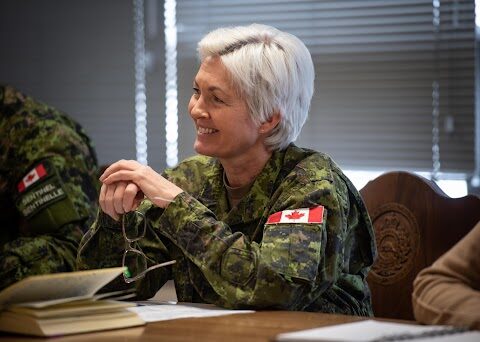Canada has not thoroughly addressed all aspects and ramifications of its proposed contribution to the U.S.-led coalition to destroy the Islamic State in Iraq and Syria (ISIS).
The current debate raging in Parliament and in newspaper columns is healthy for the country and provides an opportunity for different voices to examine different avenues to deal with the ISIS threat.
However, there are crucial questions that have either been inadequately addressed or have never been raised.
The first involves ISIS’s origins.
The U.S. invasion of Iraq in 2003 not only completed the process of deconstruction initiated by the sanctions, but led to a gradual decentralization of power, which helped to foment sectarian and ethnic divisions that would quickly take root and threaten the country’s sovereignty and unity.
Both the Baghdad government and its U.S. backers should have learned a valuable lesson that only inclusive politics could defeat sectarian and extremist ideologies.
The first decision of the Coalition Provisional Authority (CPA) headed by Paul Bremer was to disband the Iraqi military – a costly and deadly mistake.
Hundreds of thousands of Iraqi men were now left with no jobs, no pay and no prospects. With Iraq’s national institutions – such as the military – crumbling or being voided, these men dissolved back into their ethnic constituencies. In the years to come they would prove to be fertile recruiting ground for the militias and extremist groups that ran rampant in Iraq.
It was as if administration of Iraq, first by the U.S. military and CPA and later by Baghdad governments, was based on a how-to list published in an Extremist Militias for Dummies handbook.
Economic, political and military disenfranchisement pushed Iraq very close to a full-out civil war in 2006 as extremist militias, including ISIS’s precursors, committed waves of atrocities and murder.
Both the Baghdad government and its U.S. backers should have learned a valuable lesson that only inclusive politics could defeat sectarian and extremist ideologies.
Rise of ISIS
Unfortunately, this was a lesson lost: Between 2010 and 2014, former Prime Minister Nouri Al Maliki appropriated control of ministries based on sectarian affiliations and political loyalties.
The Iraqi army remains largely sectarian, and Sunni Sahwa militias, which were credited by U.S. commanders as having played a pivotal role in stabilizing the country, were discouraged and barred from joining national security forces.
It was during this political jockeying that ISIS – then known as the Islamic State of Iraq (ISI) – started to mobilize. Believed to have been an Al-Qaeda affiliate originating in Anbar Province, the group moved to the Nineveh province in 2007 and began a campaign of attacks, intimidation and fear.
Sunni frustrations were slowly growing and eventually culminated in ISIS’s routing of the Iraqi military and expanding control over western and northern Iraq this summer.
Canadian debate
The Canadian debate must at this point acknowledge that former Prime Minister Jean Chretien was entirely right to stay out of the 2003 war which created this quagmire to begin with.
Despite repeatedly being told that Saddam Hussein was a threat to the world (based on manipulated intelligence and bogus Weapons of Mass Destruction, WMD claims), Chretien and his government believed a military solution was the wrong one.
Today, Canadians are being told that ISIS is a threat to the world and their security.
Let us agree once and for all that ISIS is the most ruthless, merciless, uncompromising extremist group to ever emerge in the Middle East. Unlike Al-Qaeda, their strategy focuses on consolidating territory under their control and constructing an Islamist state, with an administration, court system and economic policy.
The Canadian debate must at this point acknowledge that former Prime Minister Jean Chretien was entirely right to stay out of the 2003 war which created this quagmire to begin with.
They have brutally killed Shia and Sunni alike in both Iraq and Syria, as well as persecuted and murdered minority Christians, Yazidis and any group they can easily label as “apostate”. Even former Iraqi resistance fighters have not been spared.
ISIS commands fighters from Bosnia, Chechnya, Libya, Afghanistan and a host of other countries considered Western allies; their numbers are growing – as thousands of politically disenfranchised flock to their ranks.
If unchecked, they will continue to grow, slowly making a mockery of one Arab military after another; they are an acknowledged threat to Muslim and Arab countries.
That perhaps explains why Arab countries that had previously provided support to ISIS and other Islamist militant groups to overthrow the regime of Syria’s Bashar Al Assad have now awakened to the fact they cannot control the beast they helped create.
Déjà vu
It’s Afghanistan all over again; Western-backed mujahideen morphing into Western-opposed Taliban and Al-Qaeda.
And just like in Afghanistan, battle-hardened jihadists will return home one day — the question then becomes whether they will turn on their home societies and attempt to create Islamist states there?
In the 1990’s (and some argue well into 2014), Egypt fought its war with ideological and militant jihadists returning from Afghanistan and Bosnia.
Could Canada face such a challenge? It is not improbable. But Muslims in Canada would probably be the first to stand up to returning jihadists, much as mainstream clerics in the Middle East have condemned ISIS’s ideology and practices, and forbade young men and women from joining them.
The examination of ISIS’s rise to power leads us to the second question that has not been addressed in this passionate debate: What happens once ISIS is defeated and destroyed?
(Did anyone ask what happens in Iraq after Saddam Hussein is removed from power?)
Iraq is in a state of disrepair and needs international scrutiny and efforts to set it on the right course.
But Muslims in Canada would probably be the first to stand up to returning jihadists …
Any military consideration to deal with ISIS must be in parallel with a focused and persistent political dimension that ensures a post-ISIS Iraqi government is inclusive of all sects and denominations.
U.S. Secretary of State John Kerry has hinted that Washington will pressure Baghdad to reverse the course of the past eight years and make concerted effort to bring Sunnis into the fold.
But hints and ‘ahems’ are simply not enough.
Staying out
Yes, Liberal leader Justin Trudeau is right to call for humanitarian assistance in Iraq and Syria, but that, too, falls short.
Iraqis and Syrians don’t want to be given Happy Meals, refreshing toiletries and tents to inhabit in the desert. They want to go home and live in their neighborhoods safe and secure without the fear of a sectarian militia towering over them swords and Kalashnikovs in hand.
The New Democratic Party (NDP) came closest to highlighting the crux of the ISIS issue when Tom Mulcair said that Canada should use “every diplomatic, humanitarian and financial resource” to respond to the human tragedy unfolding on the ground, and “strengthen political institutions in Iraq and Syria”.
Events this past weekend should serve notice to those seeking to rush Canada into a war it cannot win militarily. On Monday, ISIS fighters in Syria continued their sweep of Kurdish villages in northeastern Syria by gaining control of most of the town of Kobani near the Turkish border. Kurds in Syria say coalition air strikes have not worked. A week earlier, ISIS seized control of 60 Kurdish villages forcing nearly 160,000 people to flee to Turkey.
In Iraq, local authorities in the city of Hit in the western Anbar province said that at least 18 civilians were killed and many injured in U.S. air strikes targeting ISIS positions.
A few days earlier, U.S. Apache helicopters were used in combat operations against ISIS fighters who were reported to be nine kms. from Baghdad.
Mission creep is all too real a possibility in the weeks and months ahead. With every errant missile that kills Iraqi and Syrian civilians, ISIS gains sympathy and fresh recruits.
Chretien’s decision to stay out of the last coalition reaped Canada considerable global dividends.
“The dark clouds of terror are gathering in Iraq and Syria, threatening to strike their thunder from India to Spain,” Foreign Affairs Minister John Baird told parliament on Monday.
“We must not let this storm descend on Canada, and we know that it will if left unchecked,” he said of Ottawa’s mission in Iraq and Syria.
Stopping ISIS is not in debate here; the issue is how.
Chretien’s decision to stay out of the last coalition reaped Canada considerable global dividends.
Canada’s mission must, therefore, build on these dividends and carry an equally powerful diplomatic and political component. No military strategy will ever resolve the crisis in Iraq. The more militant the response the greater ISIS’s lure becomes.
Firas is a Canadian journalist of Arab descent who has covered the Middle East since 1992. In April 2010, he left Al Jazeera‘s English-language website, where he worked as a senior editor since 2004. In September 2010, he joined the American University of Cairo as an associate professor of practice at the Journalism and Mass Communication department. He is a member of New Canadian Media’s Editorial Board.
Journalism & Communication Dept Chair; Managing Co-Editor @ Cairo Review of Global Affairs, American University in Cairo





